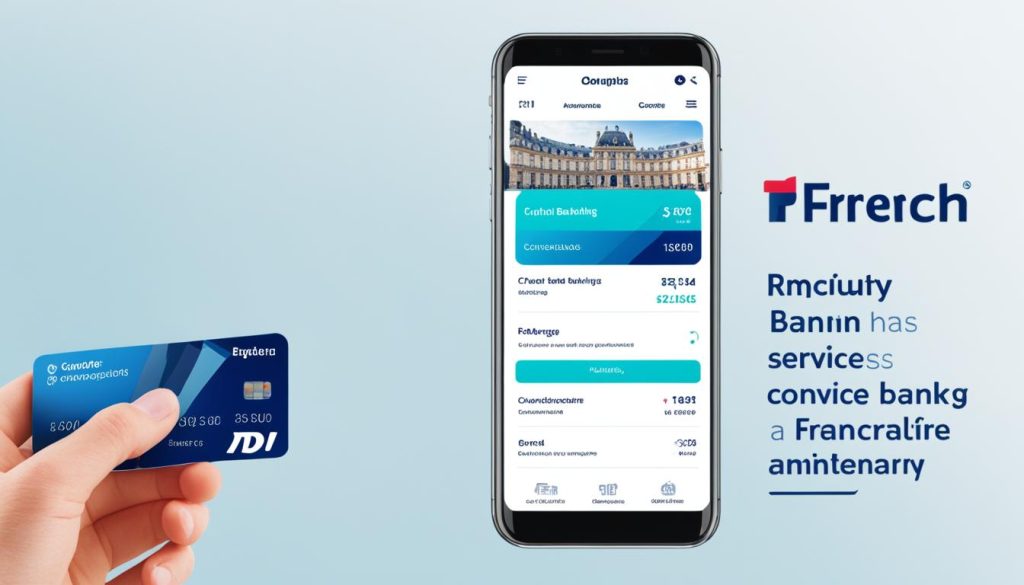In recent years, France’s financial world has seen big changes. Digital banking is now a major force. As tech gets better, old banking ways are pushed aside by new, digital options. These offer ease, reach, and many advantages for users.
Digital banking’s growth in France is impressive. A tech-savvy population desires quick and smooth banking. Thus, digital banking has spread fast. More people are using it, and banks offer more digital services than ever.
Key Takeaways
- Digital banking is leading the change in France’s financial landscape.
- The rise of digital banking in France is driven by a tech-savvy population.
- Digital banking offers convenience, accessibility, and a wide range of benefits for consumers.
- The role of traditional banks is evolving as they adapt to the digital era.
- Digital banking promotes financial inclusion and economic growth in France.
The Rise of Digital Banking in France
Digital banking in France is growing thanks to tech progress, changing needs, and new laws. Banks are going digital to improve service and make things efficient.
With more people using smartphones and the internet, folks in France like banking online. It’s handy, letting them handle money and bank services anytime, anywhere.
New laws, like the PSD2, have sparked more competition and innovation in banking. They push banks to work with others, offering better services. This means traditional banks have to get digital to keep up.
New fintech startups and online-only banks are shaking things up. Companies like Revolut, N26, and Lydia are bringing new options. They offer cool products and better rates, making them popular in France.
Old-school banks in France see the shift. They’re going digital too, to keep customers happy. They’re rolling out mobile apps, easy online account setups, and links to other services.
| Factors | Description |
|---|---|
| Advancements in Technology | Rapid technological advancements have paved the way for digital banking, enabling secure and seamless online transactions. |
| Changing Consumer Preferences | French consumers are increasingly embracing digital channels for banking services, seeking convenience and accessibility. |
| Regulatory Changes | The Revised Payment Service Directive (PSD2) has encouraged open banking and fostered innovation in the financial industry. |
| Fintech Disruption | Fintech startups and digital-only banks have introduced innovative products and services, challenging traditional banks to adapt. |
The future of digital banking in France looks bright with ongoing tech advancements and changing customer needs. The collaboration between old banks and fintech firms is transforming the banking world for today’s digital-first consumers.
The Benefits of Digital Banking
Digital banking has changed how we handle our money, offering lots of benefits. It has altered traditional banking greatly. It makes accessing accounts easy, transactions cost-effective, and improves security. Digital banking is now popular among individuals and businesses.
Convenience
Digital banking’s main perk is its convenience. It lets customers use their services anytime, without visiting a bank. Tasks like checking balances, transferring money, or paying bills are easy from home or via mobile apps.
Accessibility
Digital banking removes barriers, making finance services available to more people. This helps those in remote areas or with mobility issues. Now, anyone with internet can manage their money without worrying about their location.
Cost-effectiveness
Digital banking saves money. Unlike traditional banking, it often makes services like paper statements free or cheaper. It also costs less for banks, which could mean better rates and lower fees for you.
Improved Security Measures
Security is key for banking. Digital banking uses strong security to protect customers. It has encryption, multi-factor authentication, and fraud detection to keep your info safe. Plus, tracking your transactions is easier, helping spot any suspicious activity.
Personalized Financial Management
Digital banks offer tools for managing your money. They help you understand your spending, set goals, and offer saving tips. This helps you make wise financial choices and control your money.
Efficient Customer Support
Customer support is easy with digital banking. Most platforms offer live chat or messaging for quick help. This means no long waits at a bank. They also have FAQs and self-help for common issues.
Digital banking has many benefits beyond just being convenient and easy to access. It saves money, keeps your money safe, and offers personal finance tools. It’s changed how we deal with our finances, making it easier and more secure. “p>
Digital Banking Services in France

France has seen a big move towards digital banking, with many options for users. Technology pushes banks to adopt digital ways to meet their customer’s needs.
Mobile Banking Apps
Mobile banking apps are a hit in France. They let users handle their accounts, make transactions, and use other banking services on mobile devices. They’re easy to use and secure, making banking convenient for those always on the move.
Online Banking Platforms
French banks also have online platforms. These allow customers to do banking through the internet. Users can check balances, transfer funds, pay bills, and manage accounts safely and easily without going to a bank.
Contactless Payments
Contactless payments are popular in France. They let people pay quickly and safely using their cards. Just by tapping their card on a reader, the payment is done. This method is quick, removes the need for cash, and speeds up buying.
Digital Wallets
Digital wallets are becoming more common in France. They’re a secure and handy way to pay with smartphones. Users link their bank accounts or credit cards to a wallet app. This lets them make payments easily in stores, online, and to friends. Security is strong, ensuring payment details are safe.
The digital services in France include mobile and online banking, tap payments, and digital wallets. They give users more control of their money, making things convenient, fast, and secure in today’s digital world.
The Role of Traditional Banks in the Digital Era
In today’s digital age, France’s old-fashioned banks see the need to change. They’re bringing in digital banking to keep up and serve their customers better. With years of trust and a big list of customers, these banks are key to what banking will become.
These banks quickly saw the chance that digital tech offered and invested a lot in their online systems. Now, they let customers bank smoothly from anywhere. This includes banking on the web, using mobiles, making contactless payments, and having personal finance tools online. They’re broadening their services to keep up with what their customers now want.
These banks also add a layer of trust and steadiness to the digital banking scene. Customers feel safe with them because of their long history and strict regulations. In a world where online risks are common, traditional banks work hard to keep their customer’s information safe.
The Future of Collaboration: Traditional Banks and Fintech Startups
Staying on top needs old schools to work with fintech startups. These new companies bring fresh ideas and a quick way of doing things that banks can use. By joining forces, they can mix traditional banking with new tech. This helps create things that really meet what their customers need.
| Traditional Banks | Fintech Startups |
|---|---|
| Extensive customer base and trust | Innovative technology solutions |
| Robust regulatory frameworks | Agile and flexible approach |
| Established infrastructure | Enhanced user experience |
| Expertise in financial services | Access to new customer segments |
This teamwork is sparking new ideas in digital banking. By mixing their strengths, they’re making banking better for the customer. It makes sure that traditional banks can keep up with new digital competitors.
In the end, France’s traditional banks are very important today by taking up digital services and working with fintech startups. They use their strong reputation, trust, and know-how to help shape the future of banking. This makes sure they meet their customer’s current digital needs.
Financial Inclusion and Digital Banking
Digital banking helps increase financial inclusion in France. It uses technology to give banking services to those who have less access. This makes it easier for people in remote areas to use these services.
Financial inclusion is about making sure everyone can use financial services. It targets those left out by traditional banks. This includes people without nearby bank branches and those in rural areas.
Now, people can use digital banking through their smartphones or computers. They don’t need to visit a bank. This makes financial services available to more people.
Opening a bank account online is a major advantage of digital banking. In just a few steps, anyone can start using banking services. This includes saving, transferring money, and paying bills. It opens doors to credit and investing too.
Digital banking also offers financial education online. It helps people learn about money and make smart choices. This leads to better management of their finances.
Digital banking also boosts the economy. It lets more people join economic activities, like getting paid and accessing loans. This helps create jobs and encourages businesses to start.
As digital banking grows in France, more people can use banking services. Yet, it’s important to make these services easy for everyone to access. This includes helping those with disabilities or who are not tech-savvy. Banks, regulators, and tech companies must work together for an inclusive banking system.
| Benefits of Financial Inclusion through Digital Banking | Ways Digital Banking Promotes Financial Inclusion |
|---|---|
| 1. Access to basic banking services | 1. Opening bank accounts online |
| 2. Opportunity for credit and investment | 2. Providing financial education resources |
| 3. Tools for financial management | 3. Empowering individuals to make informed financial decisions |
| 4. Economic participation and growth | 4. Driving entrepreneurship, job creation, and investment opportunities |
Innovation in Digital Banking

Digital banking in France is growing fast with new technologies. Banks are improving customer experiences and making financial services better. These changes make banking more convenient and personal for everyone.
AI-powered chatbots are a big step forward. They let customers talk to the bank anytime. These chatbots answer questions, guide users, and give financial advice. With AI, banks can help customers faster and more efficiently.
Robo-advisors are changing how we invest. They use algorithms to suggest investments that fit a person’s goals and risk level. This makes it easy for anyone to get expert investment advice and grow their money.
Digital banks also offer tools to manage finances better. These tools help people track spending, set goals, and see their progress. By looking at transaction data, these tools give helpful tips to save money and spend wisely.
New technologies are changing how we bank. Even traditional banks are adopting digital ways to stay competitive. They know it’s important to keep up with these changes to serve customers well.
The Future of Digital Banking
Looking ahead, digital banking will get even better. Innovations like machine learning, blockchain, and biometrics will make banking smoother and safer. Customers will enjoy even more secure and personalized banking experiences.
Digital banking is evolving fast, offering more convenience and smart solutions. As technology advances, digital banks will keep innovating. They’ll bring new features that meet the changing needs of their customers.
Security and Privacy in Digital Banking
Security and privacy matter a lot in digital banking for both banks and their customers. Most of our banking and personal info is now online. Because of this, it’s critical to have strong protection in place.
Ensuring Secure Transactions
Banks use top-notch security tech to keep our data and privacy safe. They use encryption, firewalls, and SSL to guard info during transactions. These actions help keep our online transactions safe from hackers.
Protecting Customer Data
Banks also have solid rules to keep our data safe from breaches. They store our info in very secure spots, with layers of passwords and constant checks. This focus keeps our personal details private and safe.
Phishing and Fraud Prevention
To fight fraud, banks teach us about scams like phishing. They send messages and run campaigns to help us spot and avoid phishing. Banks also have systems to quickly spot and stop fraud, protecting our accounts all the time.
Collaboration with Regulatory Bodies
Banks work with watchdogs to make digital banking secure and private. They follow high standards and rules, doing regular checks and risk assessments. This teamwork helps find and fix weak spots, making digital banking safer for all.
Banks value security and privacy, earning our trust in using digital banking. As protecting data gets more focus, banks work hard to offer safe and easy online banking.
| Benefits of Security in Digital Double-check all links and make sure they’re correctly inserted..s as they are. All outgoing links in the text, if any, must be retained. | Benefits of Privacy in Digital Banking |
|---|---|
Prevention of identity theft |
|
The Impact of Digital Banking on Traditional Branches
In recent years, digital banking has changed how we handle money. Many people now prefer digital services over walking into a bank. This choice is due to the ease and access digital banking provides.
This preference impacts traditional banks greatly. With more people going online for banking, fewer visit physical branches. Banks have had to change their strategies because of this.
Many banks have had to close some branches. This is because more customers are banking online. Some people might have to travel further for a branch or not have one nearby.
But, traditional branches still matter for certain services. Some transactions are complex and need face-to-face talks. Branches are also key in gaining trust and giving personalised advice.
Digital banking pushes banks to upgrade their technology. They need strong systems for more online transactions. Banks must invest in safety, data analysis, and making their online services easy to use.
Banks are also changing their physical branches. They want to make them more about customer experience. New branch designs include interactive areas and self-service options. They aim to give a better service for those who prefer meeting in person.
The Transition from Traditional to Digital Banking
Shifting to digital banking can be hard for some. Customers used to in-person banking might find it tricky. Banks need to help by offering support and guides for a smooth transition.
Digital banking’s effect on traditional banking is clear. While moving online has many perks, it also means banks must change how they operate. However, physical branches will still be important. They will work alongside digital services to keep offering good banking.522>
Regulation and Compliance in Digital Banking

Digital banking is changing finance in France. Regulations ensure these services are safe and steady. Banks need to follow these rules to earn their customers’ trust and keep the finance system honest.
In France, digital banks have to follow strict rules. These are set by authorities like the French Prudential Supervisory Authority and others.
These banks work hard to keep customer data safe and fight crimes like money laundering. They check who their customers are very carefully. This reduces risks and meets legal rules against money laundering and terrorism funding.
Digital banks also need to protect customer data under the GDPR. This means they keep customer information safe and give people control over their own data.
Regulatory Sandbox: Fostering Innovation within a Controlled Environment
The French government has a special program to help digital banks try new ideas safely. This “sandbox” lets them test new things while being watched by regulators. It helps these banks come up with innovative solutions and improves customer service.
Collaboration between Regulators and Industry Players
French regulators talk with digital banks to make helpful rules. They aim to support new ideas while protecting customers.
Through these talks, banks can learn about new rules early on. They help shape these policies, ensuring fair play in digital banking. This cooperation helps banks stay up to date and competitive.
| Regulatory Benefits for Digital Banks in France | Compliance Challenges Faced by Digital Banks |
|---|---|
|
|
Digital Banking and Economic Growth in France
France is moving towards digital banking and seeing its economy grow. Digital technologies in finance lead to more innovation and change how we bank. This is key for economic growth.
Job Creation and Increased Efficiency
Digital banking has made more jobs in France, especially in tech and customer service. Banks need people skilled in software, data, and security. This creates jobs and builds a skilled workforce.
Banks are now more efficient thanks to digital services. Customers do their banking online instead of going to branches. This makes the banking process smoother and helps the economy grow.
Enhanced Competitiveness
French banks stay ahead by using digital banking. This lets them offer new services and keep their customers. Being competitive helps France’s financial sector grow and draw in investments from abroad.
Financial Inclusion
Digital banking makes finance more accessible in France. It lets more people use banking services, even those previously left out. This inclusion drives economic growth by opening up new markets.
Successful Digital Transformation
France’s banking sector has grown thanks to digital technology. Banks meet consumer needs, cut costs, and stay competitive. This change has revolutionised banking and boosted the digital economy in France.
The Path Ahead
The future of digital banking in France is bright. Advances in technology and support from regulations will fuel growth. Banks, policymakers, and tech providers must work together. This collaboration will ensure France benefits fully from digital banking.
Future Trends in Digital Banking
Technology is reshaping the financial industry in France, bringing exciting digital banking trends to the forefront. These developments cater to customer demand and the capabilities of new tech. They aim to introduce novel, helpful banking services.
1. Open Banking
Open banking allows third-party developers to use secure APIs to access bank customer data. It lets customers share their financial details with trusted third parties. This sharing fosters personalised services and better credit access. With the European Union’s PSD2 regulation, including France, open banking will grow and spark innovation.
2. Blockchain Technology
Blockchain technology promises to revolutionise digital banking. Its benefits include stronger security, clear transactions, and efficient operations. France is already exploring blockchain with digital IDs, smart contracts, and DeFi platforms. As blockchain use expands, it will further secure and simplify digital banking.
3. Artificial Intelligence (AI) Integration
AI is transforming digital banking with chatbots, robo-advisors, and tailored recommendations. The future will see even broader AI use. It will analyse data, enhance security, and streamline operations. AI’s ongoing evolution will majorly boost customer service and operational effectiveness.
4. Enhanced Mobile Banking
The rise of smartphones makes mobile banking’s future exciting. Mobile apps will offer easier access to various financial services. Features will include fingerprint login, voice commands, and instant alerts. As mobile banking becomes more user-friendly, it will redefine finance management.
5. Focus on Financial Wellness
Digital banking will increasingly support financial health. Banks will use data and AI for custom advice, budgeting aids, and helpful suggestions. This approach aims to build trust and focus on the customer’s needs.
Conclusion: The Future of Digital Banking in France
We’ve seen how digital banking in France offers convenience and innovative solutions. It’s changing the way we use financial services. Now, banking is possible everywhere, anytime. This shift towards digital is shaping the future of banking.
Digital banking is bound to grow with advancing technology. It aims to make banking easy for everyone, including those who currently don’t use banks much. This will help bridge the gap between traditional services and the unbanked.
Soon, we’ll see new tech like artificial intelligence and blockchain in digital banking. These will make online banking safer and more private. Plus, France’s digital banking will meet all the needed regulations to keep customer data safe.
To sum up, digital banking’s future in France looks very bright. Its easy access and potential for new features mean banking will change for the better. As this digital wave grows, classic banks must work with digital ones to improve banking for everyone.
















